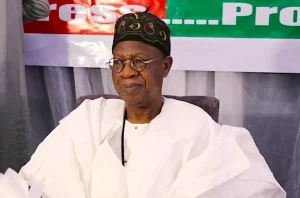Lai Mohammed Opens Up: How Fake News Nearly Ruined My Marriage

Lai Mohammed Opens Up: How Fake News Nearly Ruined My Marriage

Lai Mohammed Opens Up: How Fake News Nearly Ruined My Marriage
In a candid and heartfelt revelation, Nigeria’s former Minister of Information and Culture, Lai Mohammed, shared a deeply personal account of how fake news almost destroyed his marriage. Speaking at a recent seminar on media ethics and responsible journalism, Mohammed detailed the harrowing experience and underscored the urgent need for a collective effort to combat the spread of misinformation.
Lai Mohammed, a prominent figure in Nigerian politics, has long been an advocate for truth and accountability in media. However, his latest public appearance took a personal turn as he recounted the emotional turmoil caused by a series of fabricated stories targeting his family life.
“Fake news is not just a public nuisance; it’s a personal nightmare,” Mohammed began. “I stand before you not only as a public servant but as a husband and a father who has faced the devastating impact of malicious falsehoods.”
Mohammed detailed how a particular fake news story, which circulated widely on social media, alleged infidelity and other salacious claims about his personal life. The baseless allegations quickly gained traction, amplified by online platforms and unscrupulous blogs eager for sensational content.
“The story was entirely fabricated, with no basis in truth whatsoever,” he said. “But in the age of digital media, lies spread like wildfire, and before we knew it, the damage was done.”
Strain on Marriage and Family
The false accusations took a significant toll on Mohammed’s marriage, causing strain and distress for him and his wife. He described how the relentless rumors led to misunderstandings and emotional pain within his family.
“My wife and I have always had a strong relationship, built on trust and mutual respect,” Mohammed shared. “But even the strongest bonds can be tested by a constant barrage of lies and innuendo. We had to face scrutiny from the public and endure the whispers and side glances from people who believed the false stories.”
In his speech, Mohammed emphasized the critical role that journalists and media outlets play in society. He called on media practitioners to adhere to ethical standards and prioritize accuracy over sensationalism.
“Journalism is a noble profession, but it comes with immense responsibility,” he said. “The power of the press must be wielded with integrity and a commitment to the truth. Irresponsible reporting can have real, human consequences, as my family and I have experienced firsthand.”
Mohammed also highlighted the steps that need to be taken to combat the proliferation of fake news. He called for stronger regulations, improved media literacy, and greater accountability for those who spread false information.
“We must all work together to fight the scourge of fake news,” he urged. “This includes the government, media organizations, social media platforms, and the public. We need robust laws to deter and punish those who deliberately spread false information. We also need to educate the public on how to discern credible news sources from fake ones.”
Despite the challenges he faced, Mohammed expressed optimism about the future. He praised his wife for her unwavering support and resilience throughout the ordeal and shared that their relationship has emerged stronger.
“This experience has taught us the importance of communication and trust,” he said. “My wife and I have come through this stronger and more united than ever. I am grateful for her strength and understanding.”
In closing, Lai Mohammed made a heartfelt appeal to all Nigerians to be vigilant and responsible in their consumption and sharing of news.
“Let us all commit to verifying the information before we share it,” he implored. “Fake news is a threat to our society, and we all have a role to play in combating it. Together, we can create a media landscape that upholds truth, integrity, and respect for individuals and their families.”
Do you find Tmaq Media useful? Click here to give us five stars rating!



















